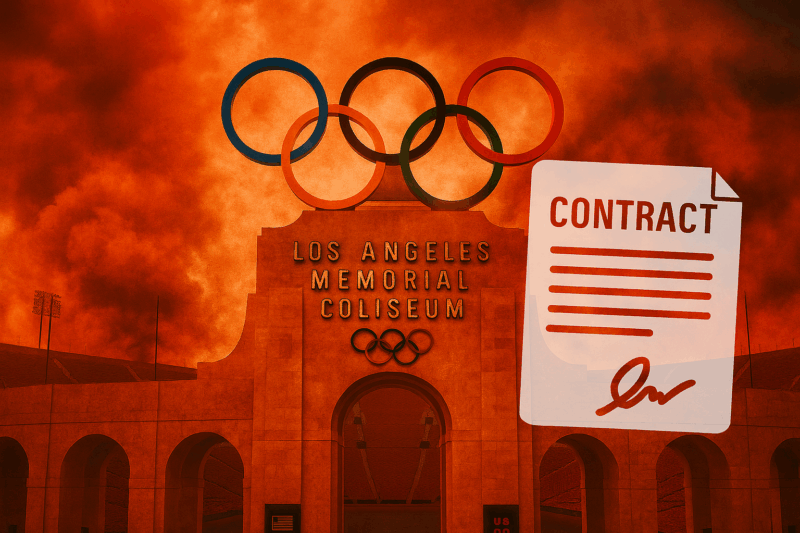With less than three years until the 2028 Summer Olympics, Los Angeles is locked into hosting despite growing calls for withdrawal due to wildfires, a $1 billion city deficit, and immigration raids. The LA28 Olympics, set for July 14–30, 2028, are bound by a strict host city contract (HCC) signed in 2017, making cancellation nearly impossible without massive financial and legal consequences. As the International Olympic Committee (IOC) allows venue naming rights for the first time and LA28 secures over 70% of its $2.5 billion sponsorship goal, preparations press forward. This article examines why L.A. can’t back out, the city’s readiness, and the broader implications.
Legal and Financial Barriers to Withdrawal
The HCC, signed by then-Mayor Eric Garcetti and City Council President Herb Wesson in September 2017, binds Los Angeles and the U.S. Olympic and Paralympic Committee to host the LA28 Olympics. It outlines termination procedures only for the IOC, not the host city, leaving L.A. with no legal exit without facing lawsuits. International arbitration lawyer Nathan O’Malley notes that breaching the contract, especially over political disputes, could lead to “substantial legal issues.” The IOC could sue for damages, as seen with Tokyo’s 2021 Games, where cancellation costs were estimated at $4–5 billion by economist Andrew Zimbalist, or $16.6 billion by the Nomura Research Institute.
The HCC allows LA28 to request relief for “undue hardship” unforeseen at signing, but the IOC isn’t obligated to grant it. Even the COVID-19 pandemic didn’t meet this threshold for Tokyo, despite 83% of Japanese voters favoring cancellation in a 2021 Asahi Shimbun poll. The IOC’s authority to move or cancel the Games is limited to extreme cases like war, civil disorder, or serious safety threats, requiring 60 days’ notice to address issues.
Why Relocating Is Nearly Impossible
The LA28 Olympics will be the largest ever, hosting 11,198 athletes and the Paralympics for the first time in L.A. This scale dwarfs the 1976 Winter Olympics in Denver, the only instance of a host city withdrawing after selection. Denver’s exit, driven by a voter ban on public funding, led to relocation to Innsbruck, Austria, which had hosted in 1964. With only 1,123 athletes, that move was feasible, but today’s logistics—massive TV production and global scale—make finding a new host on short notice “a nearly impossible task,” per sports marketer Michael Payne.
L.A.’s 11-year planning window since 2017, the longest in Olympic history, and its existing venues like the L.A. Coliseum and SoFi Stadium, position it uniquely. Relocating to another city, which would likely need new venues, is unrealistic with three years left. Sports historian Mark Dyreson notes L.A.’s Olympic legacy—having hosted in 1932 and 1984—makes withdrawal culturally and reputationally damaging.
Current Challenges and Criticisms
Calls to cancel the LA28 Olympics stem from recent crises: January 2025 wildfires in Pacific Palisades and Altadena, a $1 billion city budget deficit, and immigration raids fueling community unrest. President Trump’s role as head of a federal Olympic task force, announced August 5, 2025, has intensified opposition, with critics like L.A. Times columnist Gustavo Arellano warning Trump could use the Games to advance his political agenda during the 2028 election year. Grassroots groups like NOlympics LA argue the $6.9 billion budget could balloon to $18.8 billion, citing a 172% average cost overrun since 1960, diverting funds from housing and social programs.
Transportation and security remain concerns. A proposed $5 ticket tax for transit funding (Assembly Bill 1237) and a hotel workers’ union ballot measure could complicate logistics. The city is liable for the first $270 million in overruns, despite LA28’s promise to cover operational costs. Visa denials for athletes from Cuba, Venezuela, and Senegal raise fears about international access, though Trump’s June 2025 proclamation exempts Olympic participants.
L.A.’s Preparedness and IOC Confidence
L.A. benefits from existing infrastructure, unlike past hosts requiring costly new stadiums. Venues like Dodger Stadium for baseball and the Rose Bowl for soccer reduce expenses. The IOC’s unprecedented approval of venue naming rights—e.g., Honda Center for volleyball—eases costs, with LA28 securing $1 billion in sponsorships. Michael Payne, a former IOC executive, says L.A. is “better prepared than any city has ever been.” IOC President Thomas Bach and ASOIF’s Ingmar de Vos express confidence, citing support from Trump, Governor Gavin Newsom, and Mayor Karen Bass.
The 1984 L.A. Olympics, the only modern Games to turn a $235 million profit, set a precedent. LA28 aims to replicate this, with the IOC offering up to $2 billion and waiving its 20% surplus share.
Broader Implications
Withdrawing would harm L.A.’s global reputation, given its Olympic history and the IOC’s reliance on its infrastructure. The Games could drive long-term gains, like transit upgrades, but critics warn of gentrification and displacement, as seen in Rio 2016, where 70,000 were displaced. Economist Andrew Zimbalist argues the economic benefits are often “near-zero,” with cities like Athens 2004 facing lasting debt. L.A.’s challenge is balancing these risks with opportunities to showcase its global appeal.
Key Details of LA28 Olympics
| Aspect | Details |
|---|---|
| Dates | July 14–30, 2028 |
| Athletes | 11,198, plus Paralympics |
| Budget | $6.9 billion, with $1B in sponsorships secured |
| Venues | L.A. Coliseum, SoFi Stadium, Rose Bowl, Honda Center |
| Risks | $270M overrun liability, visa issues, wildfire season |
| Contract | HCC signed in 2017, no host withdrawal option |
Conclusion
Los Angeles is committed to the LA28 Olympics, with legal, financial, and logistical barriers making withdrawal unfeasible. Despite challenges like wildfires, budget deficits, and political tensions, L.A.’s infrastructure and IOC support position it well. The Games offer economic potential but risk exacerbating local issues. As preparations continue, the world watches L.A.’s third Olympic chapter.





